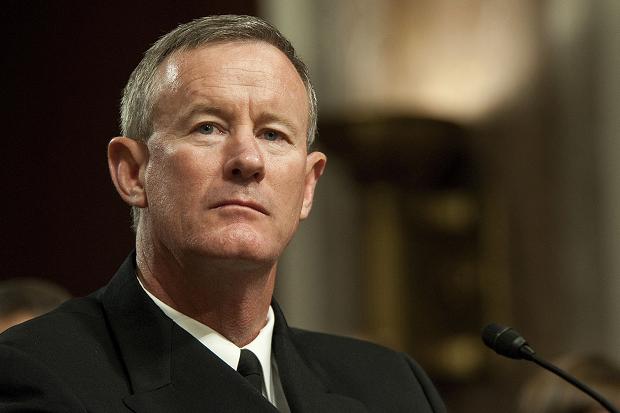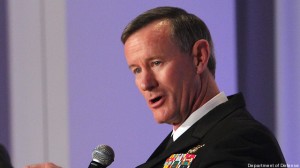What’s Eating Bill McRaven: Is Congress Too Ignorant Of The Military?
Posted on

The US military is still at war but Washington is not. The resulting tensions are eroding the fundamental compact between America’s warrior and political classes.
The recent op-ed by retired Adm. William McRaven, former head of Special Operations Command and the man who led the strike against Osama Bin Laden, might have caused a national furor in more normal times.
McRaven had aimed a withering broadside of criticism at Capitol Hill. He accused lawmakers of cynically scuttling the career of a trusted former subordinate; routinely abusing and disrespecting senior military leaders to advance their political agendas; and undermining command authority and good order and discipline in military ranks through undue pressure and political correctness.
The fact that this howl of protest in the Tampa Tribune from one of America’s most respected warriors barely elicited a response, and was quickly drowned out in the din of the daily news crush, is yet another symptom of a growing malaise in civil-military relations. McRaven’s writ against Congress deserves careful consideration not only due to his reputation for thoughtfulness, but also because the intense frustrations he gives voice to are privately shared by many senior U.S. military officers.

Rear Adm. Brian Losey, ret.
McRaven specifically took issue with a group of senators who forced Rear Adm. Brian Losey, commander of the Navy’s SEAL Teams, into premature retirement. A Pentagon Inspector General’s investigation concluded that several years ago Losey retaliated against whistleblowers on his staff who may, or may not, have questioned his travel expenditures. The Navy disagreed and wanted to promote Losey. Describing the IG investigation as a “miscarriage of justice,” McRaven blasted lawmakers for torching Losey’s career and reputation. McRaven pointedly noted that Losey was a veteran of numerous combat deployments to both Afghanistan and Iraq, and had “sacrificed more for this country than most members on Capitol Hill.”
If McRaven had left it there, his criticisms might have been dismissed as a former commander’s overzealous defense of a subordinate. Instead he went on to frame the case as part of a more general erosion in the core compact between civilian and military leaders. That compact relies on mutual respect, a common understanding of the unique prerogatives of each institution, and restraint on both sides in terms of military officers becoming involved in the partisan political battles of Washington, D.C. For centuries that compact has ensured unquestioned civilian control of the U.S. military.
“Over the past decade, I have seen a disturbing trend in how politicians abuse and denigrate military leadership…to advance their political goals,” wrote McRaven, who describes watching in “disbelief” in recent years at how lawmakers treated senior military leaders during congressional testimony: “Some lawmakers showed no respect for their decades of service.”

Adm. William McRaven, then head of Special Operations Command
In closing, McRaven warned that the erosion in civil-military relations is already undermining the effectiveness of the U.S. military, as well as the faith that uniformed leaders have in their civilian masters. “In light of the challenging times in which we find ourselves, politically and strategically, we cannot afford to have a military that loses respect for its civilian leaders,” he writes. “The strength of America always rests with our nation’s civilians. God forbid we should ever see it differently.”
Perhaps we should not be surprised that leaders of the most trusted institution in America and members of the least trusted face growing tensions in their relationship. (In a 2015 Gallup poll the military topped the list of U.S. institutions in which respondents expressed confidence, while Congress was at the bottom, with a whopping 78 percent versus 8 percent differential). Certainly the two institutions have been growing steadily apart since the end of the draft in the early 1970s, with the percentage of members of Congress with military experience having dropped from 73 percent in 1972, to 18.7 percent in 2015. When you look at the American public, that figure is even lower at about 11 percent, And the vast majority of those veterans are older than 65 years of age.
That gap in experience and the clash in cultures it engenders has widened into a chasm after more than 15 years of war.
“I think a lot of what Bill McRaven perceives as disrespect is actually Congress’ utter lack of experience and understanding of how to interact and grapple with this incredibly complex organization that is ‘the U.S. military,’” said retired Army Lt. Gen. Dave Barno, who commanded all coalition forces in Afghanistan, and now teaches at American University’s School of International Service. Add the strains of what Barno calls an era of “perpetual war,” and the result is a widening ‘I’m from Mars, you’re from Venus’ disconnect. “I don’t think it’s based on malice or disrespect, or that either side is right or wrong. But the U.S military and Congress come from almost entirely different galaxies at this point.”
McRaven doesn’t offer specific examples to back his claim that lawmakers are increasingly disrespecting senior military leaders during Congressional testimony (he declined a request for an interview). A compelling “exhibit A,” however, can be found in Sen. John McCain’s grilling of Air Force chief Gen. Mark Welsh on March 3, 2016. The chairman of the Senate Armed Services Committee (SASC) takes the Air Force to task for trying to retire the A-10 close air support aircraft in order to live within Congressionally-imposed spending limits; calls the general’s explanations “embarrassing” and “disingenuous”; and constantly interrupts the 4-star officer’s responses before abruptly dismissing him with an “Enough general, OK?” (See video). As one of Congress’ most experienced veterans and a long-serving lawmaker, McCain knows well that military protocol demands that senior officers bite their tongues in such exchanges with their civilian bosses, and his less-experienced senate colleagues see how well such rough treatment of the brass plays on cable news.
Senior military leaders are also frustrated that Congress routinely ignores their warnings of the impact on military readiness of strict spending limits associated with the Budget Control Act and automatic budget cuts associated with sequestration. Most recently, leaders of the Marine Corps have stated that cuts in readiness already taken would make it difficult to surge forces if another conflict were to arise, and are likely responsible for an increase in deadly aviation mishaps. Just before retiring last year, the chairman of the Joint Chiefs of Staff, Martin Dempsey, told me that one of his greatest regrets was not being able to find the words to adequately convey to Congress that its actions on the defense budget would lead to the blood of U.S. service members being unnecessarily spilt, and lives needlessly lost, on a future battlefield.
What about McRaven’s contention that members of Congress are more willing to drag the military into partisan disputes to advance their political agendas? One recent example is the just-completed House investigation of the 2012 Benghazi tragedy and the death of U.S. Ambassador Chris Stevens and three other Americans. For years, some congressional Republicans have insisted that U.S. military forces could have rushed to the scene of the attack and saved them, but were either slow to respond or delayed because then-Secretary of State Hillary Clinton didn’t make the call.
For just as long, senior U.S. military leaders have told House investigators that no U.S. forces could have gotten there in time given the vast distances involved, something House Benghazi Committee chairman Trey Gowdy, a Republican, only recently conceded publicly. Meanwhile, the AP recently quoted a senior Pentagon official who expressed frustration at having to respond to a “crescendo” of costly and duplicative requests from the Benghazi committee years into its investigation, some based on spurious claims made on talk radio and Facebook.
Many senior military leaders also perceive a form of disrespect in Congress’ stubborn failure to pass an authorization (AUMF) for the ongoing war against Daesh (also known as ISIL). Military officers take their oath to the Constitution, which gives Congress the sole responsibility to declare wars and authorize conflicts. To abrogate that responsibility out of partisan pique with the president, or in the hopes of avoiding a politically risky vote, means that U.S. troops are fighting in a conflict that the people’s representatives have failed to endorse or rally the nation behind. In a military culture where those oaths are sometimes recalled over gravestones to the sound of taps, such principles matter.
In his op-ed, McRaven described the case of Rear Adm. Losey as an example where an outstanding combat leader tried to bring a more urgent, wartime mindset to a sleepy rear-area bureaucracy (in this case Africa Command), and received pushback in the form of complaints to the Pentagon’s Inspector General. While the relative merits of the Losey case and IG investigation are beyond the scope of this article, that basic scenario resonates with a number of other senior leaders.
Something similar happened to retired Lt. Gen. Michael Flynn, for instance, who served as the intelligence chief for Joint Special Operations Command, as head of military intelligence in Afghanistan, and as the director of the Defense Intelligence Agency. After some of the most intense fighting in Afghanistan as part of the 2011 “surge” in U.S. forces, Flynn was subjected to a prolonged DoD Inspector General’s investigation looking into whether he wrongly shared classified intelligence.
Never mind that the recipient of the critical intelligence was a British general who was in command of a region where thousands of U.S. and British troops were in combat. Later, Flynn’s tenure at DIA was cut short because his civilian bosses found his reforms “too disruptive.” In another instance, McRaven’s deputy at SOCOM, Lt. Gen. John Mulholland, was investigated and admonished by the Pentagon IG for using profanity and over-the-top language while chewing out his staff for a subpar report.
“I have absolutely no problem with the IG or Congress taking military officers to task for illegal, unethical or immoral behavior, but I have seen an increasing number of cases where combat seasoned officers are put into positions of higher command and told to instill more discipline and a greater sense of urgency into organizations, only to have their judgement calls constantly second-guessed or investigated by the IGs of the world,” Flynn said in an interview. “If we had constantly harassed our military leaders like this in the past we would never have won World War II.”
Flynn’s removal for being “too disruptive” is a particularly striking example since he was hired for the job in part after a much-publicized 2010 report in which he eviscerated the job then being done by the Intelligence Community in Afghanistan.
Of course part of the blame for current tensions may fall on wartime commanders who have difficulty adjusting to the realities of rear-area bureaucracies and the peacetime mindset back home. But the dynamic of U.S. military leaders shaped and still gripped by the exigencies of war, and a Congress and public who have seemingly moved on, will inevitably continue to roil civil-military relations.
McRaven’s hardly the only one who’s worried. “We continue to see this growing separation between U.S. military leaders on the one side who feel their forces are at war right now in places like Iraq, Syria and Afghanistan, and on the other a White House that won’t even admit the troops are in combat, a Congress that refuses to authorize the operations, and an American public that is completely detached from the debate and has no stake in the outcome,” said retired Lt. Gen. Karl Eikenberry, who commanded all coalition forces in Afghanistan and served as the U.S. ambassador in Kabul. “Personally, I don’t think that’s healthy for the Republic.”
Some civil-military affairs experts believe McRaven stepped over the line with his op-ed, interpreting his comments to be a veiled threat. Considering the source, another possible interpretation is that an officer who devoted his life to defending the country sees a widening divide along its civil-military axis, and is alerting his fellow citizens to the danger. Of course unquestioned civilian control of the military is sacrosanct, baked into the American system of government and traditions going back to George Washington voluntarily surrendering the reins of power as president. In no imaginable future would U.S. military leaders ever buck that tradition, no more than the American people would ever select as their commander-in-chief a demagogue with authoritarian instincts who threatened to order the U.S. military to commit war crimes. That can’t happen here.
Subscribe to our newsletter
Promotions, new products and sales. Directly to your inbox.
